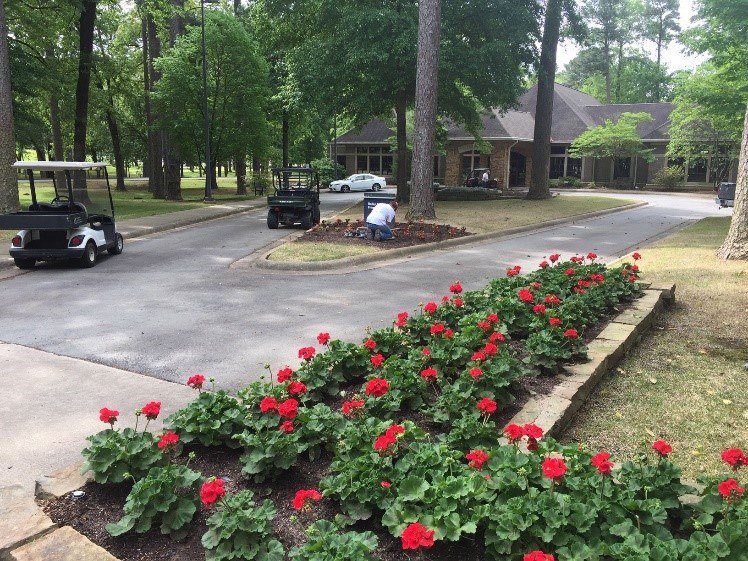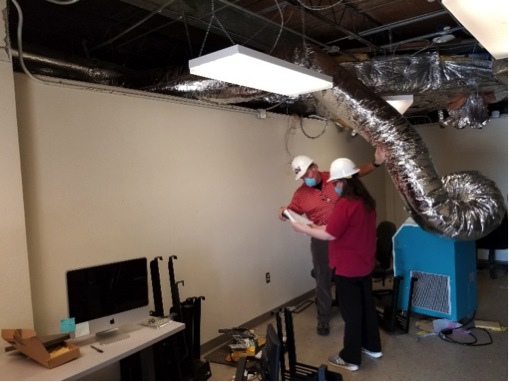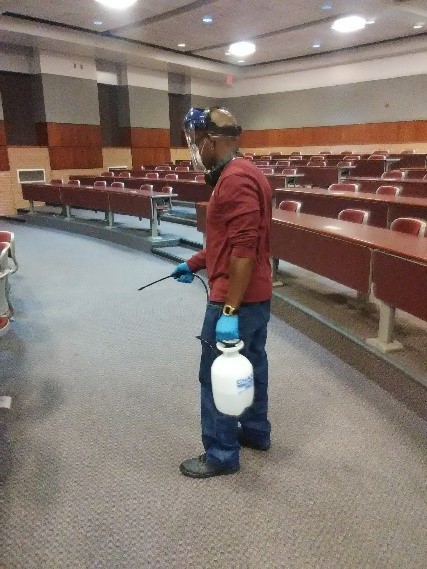 While the COVID-19 pandemic has left most faculty, staff, and students working and learning from home, the UA Little Rock Facilities Management (FM) crew have been bravely coming to work every day since a quiet campus became reality.
While the COVID-19 pandemic has left most faculty, staff, and students working and learning from home, the UA Little Rock Facilities Management (FM) crew have been bravely coming to work every day since a quiet campus became reality.
“While the future of our university remains uncertain, we continue to repair, renovate, and construct, secure in the knowledge that our campus leaders will guide us through this pandemic emerging a stronger and more versatile community,” said David Millay, assistant vice chancellor of Facilities Management.
Considered essential personnel, Facilities Management staff members have been working hard to clean and sanitize for the safety of the campus community. Dedicated FM staffers have been busy deep cleaning unoccupied campus spaces, sanitizing and sealing spaces against unnecessary use, installing pass through mailboxes, and upgrading the recycling bin distribution, just to name a few.
“Our Facilities Management team has really risen to the occasion during this pandemic time to assure ‘their’ campus remains in great condition,” said Steve McClellan, vice chancellor for finance and administration. “While they also have kids at home, elderly to care for, and the same personal anxieties the rest of us are all dealing with, they continue showing up in very high percentages daily with an unfettered drive so that when UA Little Rock is ready to reopen, we all will return to maintained grounds, clean and safe facilities, and will see evidence of continued construction projects. This has required a lot of retraining and juggling and hasn’t been easy. I have been in this business 35 years and have never ever been this proud of and for people I work with.”

Leslie Hutchins and Dale Fonville review plans for installing pass-through mailboxes at Mail Services.
FM employees have proved to be innovative and resourceful during the pandemic. One example stems from how they faced a shortage of hand sanitizer, which has become one of the most highly coveted and hard-to-get items around the country. UA Little employees took a proactive approach and made their own supply for the campus community. The FM team then produced DIY office sanitizer kits and distributed them across campus.
“We have all had to adjust the way we work by practicing social distancing, wearing masks, meeting virtually, and helping with tasks we normally don’t do,” said Leslie Hutchins, director of FM planning and capital construction. “I am proud of our team for stepping up to the challenge.”
Building maintenance has also continued without a hiccup, with projects like a new roof, ceiling, and lighting in the Center for Performing Arts, the replacement of the digital marquee, and upgrades to the exterior of the Donaghey Student Center. The much anticipated Starbucks overlooking Cooper Fountain is on track to be finished in August.
“Facilities Management staff have reported to campus every day during this pandemic because they are considered ‘essential,’” said Sandra Vail, director of FM operations and services. “They not only ensure that the campus buildings and grounds are maintained properly but provide on-going sanitization.”
Despite less foot traffic on campus, it’s business as usual when it comes to maintaining buildings and grounds.
“With 60 buildings amounting to nearly 3 million gross square feet, the UA Little Rock campus represents a sizable state asset,” Millay said. “Maintenance crews respond daily, not to mention weekend and night emergency call-ins to keep building systems operating properly and to safeguard occupants.”

Frank Hill Jr. cleaning and sanitizing in Dickinson Hall.
Millay recalled an incident in which FM crew members showed their hard work and dedication in responding quickly and efficiently to an incident in the Science Lab Building.
“In one recent event in our Science Lab building, the main electrical breaker which feeds the entire building faltered and failed,” Millay said. “The loss of power jeopardized all other building systems that heat, cool, ventilate, and light the structure, but more importantly jeopardized the ongoing research. Electrical crews led by Ian Hadden, director of energy management services, Mike Seamon, assistant director, and Geoff Owens, electric shop supervisor, worked non-stop to determine the cause of failure and ultimately replace the main breaker. This is just one example of the daily efforts put forth by these teams to keep our buildings safe and secure.”
Reduced energy consumption and utility costs continue to be a hallmark of Facilities Management. Led by Ian Hadden, director of energy management services, the employees continuously seek ways to save the university money during the pandemic. By making smart decisions like closing the parking garage, setting unoccupied temperature settings in buildings, and turning off lights in all unoccupied areas, the energy management employees have reduced its utility budget by $400,000.
“I’ve been very proud, but not surprised, of the response of our Mechanical, Plumbing, Electrical and BAS/Engineering staff,” Hadden said. “They have looked for opportunities to tackle the backlog of work where possible and focus on preventative maintenance over reactive responses. The BAS/Engineering team has done a great job seeking and finding ways to reduce our utility costs. These are great folks to work with.”